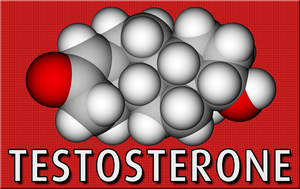 It's inevitably clear that hormones profoundly influence our feelings of love and affection for others, as well as our romantic and sexual desires.
It's inevitably clear that hormones profoundly influence our feelings of love and affection for others, as well as our romantic and sexual desires.
Though it's entirely apparent, there are still miles to go before we figure out exactly how those hormones impact our interactions with others.
There is a massive push in the scientific literature to bring us closer to understanding these complex physiological interactions, especially concerning the influence of Testosterone.
Video Link: https://vimeo.com/289164418
Video Download: Click Here To Download Video
Video Stream: Click Here To Stream Video
An article in Physiology & Behavior helps shed some light on how Testosterone influences male relationships.
One of the most notable aspects of a relationship between a man and a woman is the notion of possession. When a man and a woman are dating traditionally, both partners tend to have a desire for loyalty and faithfulness.
This recent study provides evidence that that desire for fidelity is influenced by Testosterone Levels, at least to a certain extent.
Men with elevated Testosterone Levels compared to baseline tend to put more personal energy into making sure that their lover is adequately devoted and faithful, and are more likely to respond with feelings of jealousy and competitiveness toward potential suitors.
What is Mate Retention Behavior?
 Mate Retention Behaviors are any actions that a partner takes to reduce the risk of their partner going astray.
Mate Retention Behaviors are any actions that a partner takes to reduce the risk of their partner going astray.
There is a wide range of these behaviors, many of which are favorable for the partner, but not all.
For example, many men like to provide gifts or do good things for their partners to keep them loyal. One study even examines men's propensity to offer oral sex as a Mate Retention Behavior (it's useful).
On the other hand, these behaviors often demonstrate the darker side of human relationships, such as stalking or threatening the partner.
Testosterone and Competition vs. Testosterone and Mate Retention
There has been a tremendous amount of attention paid to how Testosterone influences competition among males, both for mates and in the sense of athletic performance.
Testosterone is the driving factor that influences men to seek the attention of a partner. There has been much less focused research conducted about what happens after a man has found his mate.
It's evident that Testosterone still plays a substantial role, but the body of research just isn't there to explain the specifics.
Lead researcher Steven Arnocky made it his goal to study what happens to men after they have acquired their mate. Professor Arnocky teaches at Nipissing University and is the founder of the Human Evolution Laboratory.
The name of the study is “Intrasexual competition mediates the relationship between men’s testosterone and mate retention behavior.”
It's important to recognize that, even after a man has found a partner, there is still a competition going on. There is always the risk that another man can sweep a partner off his or her feet.
If a man wants to stay in a relationship, he's going to have to work for it, which is where Mate Retention Behaviors come into play. These behaviors can be divided into two classes: Benefit Provisioning and Cost Inflicting.
Benefit Provisioning Behaviors are positive things that men do to keep a relationship going. They give gifts.
They make women feel happy and comfortable. They help support a lifestyle that is congruent with a good life. Cost Inflicting Behaviors, on the other hand, are actions that serve to keep other men at bay or coerce the partner into staying in the relationship.
Confronting a man that talks to your girlfriend is a Cost Inflicting Behavior. Staying close to a partner in public situations to keep men away is another such behavior.
Two forms of Cost Inflicting Behavior that are popular in media and pop culture today are Negging and Gaslighting.
Negging is the act of making backhanded compliments and similar gestures to diminish confidence. Gaslighting refers to any psychological effort to make another person doubt their own views and perspectives as a means of control.
Why Is There So Little Research Regarding Mate Retention Behaviors?
As you might know, animal research is a huge aspect of our knowledge of the human condition. Humans are rare among mammals in that they tend to stay with their partner, often for life.
Most mammals mate and separate. The male might stay long enough to help rear the brood, but that's generally it. This study spends more time focusing on how Testosterone impacts pair bonding, and the male desire to sustain that bond.
This study investigated a group of 108 undergraduate males at Nipissing University.
Testosterone Levels were measured using saliva samples. Along with those samples, participants completed many surveys that investigated their feelings and notions regarding male competition for partners and their ideas on mate retention.
Upon data analysis, a significant link was discovered between Mate Retention Behaviors and Testosterone Levels, though this connection was indirect.
How Does Testosterone Impact Mating Behaviors in Men?
Specifically, Testosterone Levels appear to be linked to Intrasexual Competitive and Cost Inflicting Behaviors.
This means that Elevated Testosterone tends to make it harder for other men to come in a romantic contact with their partner. On the other hand, Testosterone does not appear to play a role in Benefit Provisioning.
Men with higher Testosterone are more likely to see other men as competitors and act accordingly but are not necessarily more likely to provide  more for their partner than a man with lower Testosterone Levels.
more for their partner than a man with lower Testosterone Levels.
While the study produced good results, there is apparently an immense amount of further investigation that needs to be done.
Future studies will likely investigate how men in committed relationships differ from single men, and how men with different Testosterone Profiles fair at mate retention.
Reference
Testosterone Fuels Both Competition and Protectiveness
Contact Us Today For A Free Consultation

- Testosterone for Women [Last Updated On: December 1st, 2023] [Originally Added On: December 29th, 2013]
- Testosterone Androgen [Last Updated On: December 11th, 2023] [Originally Added On: December 29th, 2013]
- Testosterone and Body Building [Last Updated On: December 14th, 2023] [Originally Added On: December 30th, 2013]
- Testosterone Levels [Last Updated On: December 6th, 2023] [Originally Added On: December 31st, 2013]
- Testosterone Gel, Cream, and the Testosterone Patch [Last Updated On: November 28th, 2023] [Originally Added On: December 31st, 2013]
- Buy Testosterone | Types of Testosterone Replacement Therapy Programs, Injections, Cream and Gel [Last Updated On: December 13th, 2023] [Originally Added On: December 31st, 2013]
- Buy Testosterone Injections Online, Testosterone Prescription for Low T, Testosterone Replacement Therapy [Last Updated On: October 16th, 2020] [Originally Added On: January 1st, 2014]
- Aging and Testosterone Replacement Therapy [Last Updated On: December 12th, 2023] [Originally Added On: January 3rd, 2014]
- What Causes Low Testosterone [Last Updated On: December 10th, 2023] [Originally Added On: January 7th, 2014]
- Hormone Levels in Men [Last Updated On: December 4th, 2023] [Originally Added On: January 12th, 2014]
- Hormone Level Testing [Last Updated On: November 29th, 2023] [Originally Added On: January 13th, 2014]
- Types of Testosterone Products and Delivery [Last Updated On: December 8th, 2023] [Originally Added On: January 22nd, 2014]
- Testosterone Therapy Helps Men with Low-T Ward Off Prostate Cancer [Last Updated On: May 29th, 2024] [Originally Added On: December 29th, 2019]
- The Importance of Dietary Fat for Testosterone Production [Last Updated On: July 8th, 2024] [Originally Added On: January 2nd, 2020]
- Testosterone Deficiency and Low-T at Epidemic Levels Among Men in the United States [Last Updated On: May 27th, 2024] [Originally Added On: May 17th, 2020]
- The Effects of Testosterone Therapy on Male Patients -- Who Should Use Testosterone? [Last Updated On: December 20th, 2023] [Originally Added On: June 16th, 2020]
- Does Ibuprofen Contribute to Low Testosterone? [Last Updated On: January 27th, 2024] [Originally Added On: June 20th, 2020]
- The Link Between Testosterone and Lower Rates of Autoimmune Diseases Among Men [Last Updated On: January 30th, 2024] [Originally Added On: June 21st, 2020]
- Weight Cycling and the Problem with Crash Dieting [Last Updated On: April 8th, 2024] [Originally Added On: July 30th, 2020]
- Reexamining Bio-Identical Testosterone Therapy [Last Updated On: June 18th, 2024] [Originally Added On: August 12th, 2020]
- Understanding how Muscle and Fat Impact Body Mass, Weight, and Health [Last Updated On: April 15th, 2024] [Originally Added On: August 25th, 2020]
- The Role of Nitric Oxide in Cancer Proliferation And Prevention [Last Updated On: May 3rd, 2024] [Originally Added On: August 26th, 2020]
- Understanding Heartburn in the 21st Century [Last Updated On: April 24th, 2024] [Originally Added On: August 28th, 2020]
- What is Erectile Dysfunction? [Last Updated On: April 20th, 2024] [Originally Added On: August 30th, 2020]
- Sermorelin Acetate Drug Information [Last Updated On: April 7th, 2024] [Originally Added On: August 31st, 2020]
- Exercise and Mental Health [Last Updated On: April 5th, 2024] [Originally Added On: September 1st, 2020]
- The Importance of Proteins, Carbs, and Fats [Last Updated On: March 11th, 2024] [Originally Added On: September 2nd, 2020]
- Low-T Treatment Before and After -- How Testosterone Therapy Improves Vitality [Last Updated On: April 9th, 2024] [Originally Added On: September 6th, 2020]
- Changes to LabCorp Guidelines for Low-T Diagnosis and How They Impact Your Treatment [Last Updated On: July 14th, 2024] [Originally Added On: September 22nd, 2020]
- The Effects of Testosterone on Asthma Prevalence Among Men and Women [Last Updated On: February 19th, 2024] [Originally Added On: October 6th, 2020]
- 7 Exercises to Elevate Testosterone Levels [Last Updated On: June 13th, 2024] [Originally Added On: October 10th, 2020]
- Vitamin A is Essential for Good Health - Are You Getting Enough ? [Last Updated On: April 16th, 2024] [Originally Added On: October 14th, 2020]
- Testosterone and Diet – How to Support Testosterone Levels with Healthy Eating [Last Updated On: June 7th, 2024] [Originally Added On: October 29th, 2020]
- The Significance of Telomeres in Stem Cell Treatments [Last Updated On: March 16th, 2024] [Originally Added On: November 27th, 2020]
- The Role of Testosterone in Women's Health [Last Updated On: December 24th, 2023] [Originally Added On: December 7th, 2020]
- Testosterone Promotes Bone Health and Can Help Treat Osteoporosis [Last Updated On: February 15th, 2024] [Originally Added On: December 17th, 2020]
- The Relationship Between Testosterone and Cortisol [Last Updated On: April 2nd, 2024] [Originally Added On: December 19th, 2020]
- The Importance of Sex Hormone-Binding Globulin (SHBG) for Healthy Testosterone Levels [Last Updated On: March 9th, 2024] [Originally Added On: December 28th, 2020]
- 12 Health Issues That Can Kill Libido and Limit Sexual Performance [Last Updated On: May 23rd, 2024] [Originally Added On: January 3rd, 2021]
- 4 Foods to Boost Your Testosterone Levels [Last Updated On: February 7th, 2024] [Originally Added On: January 4th, 2021]
- Low Testosterone Symptoms [Last Updated On: December 31st, 2023] [Originally Added On: January 7th, 2021]
- Is Male Menopause Real? The Science of Andropause [Last Updated On: January 15th, 2024] [Originally Added On: January 11th, 2021]
- Relieve Fatigue and Increase Energy with Testosterone Replacement Therapy [Last Updated On: January 16th, 2024] [Originally Added On: January 16th, 2021]
- How to Administer a Testosterone Injection -- Low-T Injection Guide [Last Updated On: February 28th, 2024] [Originally Added On: January 17th, 2021]
- Testosterone Levels Associated with Serotonin Activity in the Brain [Last Updated On: March 26th, 2024] [Originally Added On: January 19th, 2021]
- Grumpy Old Man Syndrome – Causes and Treatments [Last Updated On: June 8th, 2024] [Originally Added On: January 22nd, 2021]
- The Effects of Beer on Testosterone Production and Gynecomastia [Last Updated On: March 21st, 2024] [Originally Added On: January 30th, 2021]
- Testosterone Frequently Asked Questions [Last Updated On: February 6th, 2024] [Originally Added On: February 26th, 2021]
- Testosterone Supplements: Vitamin and Amino Acid Pills Versus Real Testosterone [Last Updated On: November 21st, 2024] [Originally Added On: March 1st, 2021]
- Testosterone Side Effects, Risks, Dangers and Negative Effects [Last Updated On: November 7th, 2024] [Originally Added On: March 2nd, 2021]
- Testosterone for Men [Last Updated On: February 20th, 2024] [Originally Added On: April 13th, 2021]
- Testosterone Testing [Last Updated On: November 9th, 2024] [Originally Added On: May 7th, 2021]
- Hormone Replacement Therapy: Commonly Asked Questions [Last Updated On: February 20th, 2024] [Originally Added On: June 16th, 2023]
Word Count: 961




















